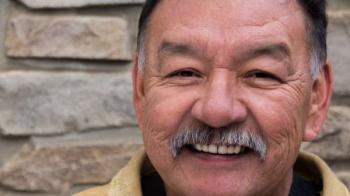Image Caption
Summary
Local Journalism Initiative Reporter
Windspeaker.com
Treaty 6 Grand Chief George Arcand Jr. will “move mountains to make sure that our survivors” get to see Pope Francis when he’s in Alberta, but Arcand admits he can only do that if Indian residential school survivors register in the next few days.
Pope Francis’ first events will be in the Edmonton area when he begins his six-day Canadian stay. He lands in Edmonton on Sunday. On July 25, he’s in Maskwacis, his only visit to a former residential school site, and at the Sacred Heart Church of the First Peoples in downtown Edmonton. On July 26, he’s leading an open-air mass at Commonwealth Stadium in Edmonton and in the late afternoon he’s at Lac Ste. Anne for the annual pilgrimage.
While the sites combined will welcome over 100,000 people, they are all by ticket only and controlled transportation.
“It’s going to be really tough for people to get up Monday morning or Tuesday morning and decide they want to go to an event. If they have not gotten a ticket, they’re not going to be allowed in those events,” said Arcand.
He urges survivors and their supporters to access any of the numerous websites to get more information and to register. Each event has a site and all have email addresses: maskwacis@papalvisit.ca, LSA@papalvisit.ca, and commonwealth@papalvisit.ca.
The three largest National Indigenous Organizations (NIOs)—Assembly of First Nations, Métis National Council, and Inuit Tapiriit Kanatami—also have information available.
In a move to “provide an additional window for Indigenous participation,” according to a statement issued on the papal visit’s website, the final block of tickets to be released for the Papal Mass at Commonwealth Stadium has been delayed until Friday. They were supposed to be released yesterday.
“In conversations over the last number of days, many Indigenous partners have requested additional time to secure their reservations. In addition, recent federal funding announcements may allow new groups with a strong desire to participate in the visit of Pope Francis, an opportunity to mobilize,” says the statement.
The federal government has committed over $35 million to the Pope’s visit, including $30.5 million for community-led activities, ceremonies and travel for survivors.
Other papal events in Alberta have seen tickets prioritized for residential and day school survivors, Elders, knowledge keepers and those supporting them through NIOs, Catholic dioceses traveling with survivors and other partners.
Arcand says to help survivors, each of the 16 First Nations in Treaty 6 has appointed someone in their community to gather names and coordinate transportation and accommodation. Care for the Elders when on site, including meals and water, will also be required as there could be a lengthy waiting period for the Pope’s arrival in what’s forecasted to be exceptionally warm weather.
“Most of the survivors are of a golden age and in many of our communities they tend to be our Elders and we want to make sure they’re looked after should they come to this kind of event. If they require support during the event or before the event, we provide the necessary supports to them,” said Arcand.
As well, he says, they are working with Health Canada to ensure mental health supports at all the Alberta events.
“(We) will continue to do longer term support once the Pope does leave because we know there will be fall out and we’re going to have to deal with some of the collateral concerns that will come about. We’re arming the communities with additional surge support should they require it,” said Arcand.
The grand chief believes there is an even split between those survivors who would like to be in attendance when the Holy Father offers his apology at Maskwacis and those who will be content to watch his address livestreamed. All the Pope’s public Canadian events will be livestreamed.
Interest to attend events has not only been expressed from survivors in Treaty 6—the land on which all the Alberta events are taking place—but throughout western Canada, the north and the United States. Churches in the U.S. also operated residential schools.
“We’ve been in contact with all of those groups trying to figure out how we can get people moved in and out,” said Arcand.
He adds it’s a toss-up as to which event those from outside Treaty 6 want to attend more: the Pope’s apology at Maskwacis or continuing the tradition of the annual pilgrimage to Lac Ste. Anne.
“I really believe that some people are not totally happy with the Pope’s visit and it’s because they were treated not good by the Catholic church and I do not blame them and I do not disrespect their position,” said Arcand.
“But there’s a lot of people who feel like they need to begin that path of reconciliation with the church and the government over what happened and the only way we can do that is begin by the Catholic church doing an apology and we might be able to build the bridges we need to build just to make the future a little bit better.”
In Pope Francis’ weekly address to people at St. Peter’s Square in Vatican City this past Sunday, the Holy Father said, “I am about to make a pilgrimage of penance, which, I hope that with the grace of God, can contribute to the path of healing and reconciliation that already has been started.”
Local Journalism Initiative Reporters are supported by a financial contribution made by the Government of Canada.

